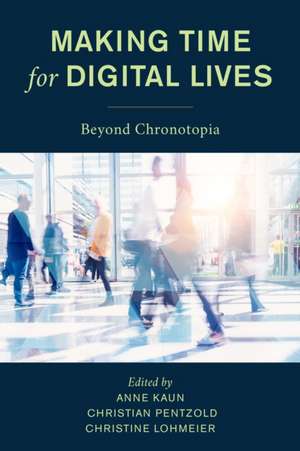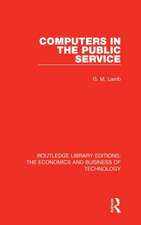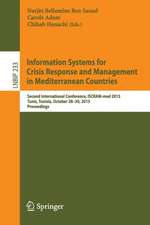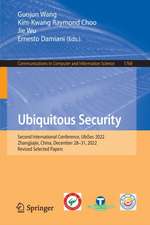MAKING TIME FOR DIGITAL LIVES
en Limba Engleză Hardback – 8 sep 2020
Preț: 837.90 lei
Preț vechi: 1047.38 lei
-20% Nou
Puncte Express: 1257
Preț estimativ în valută:
160.34€ • 171.45$ • 133.68£
160.34€ • 171.45$ • 133.68£
Carte tipărită la comandă
Livrare economică 17 aprilie-01 mai
Preluare comenzi: 021 569.72.76
Specificații
ISBN-13: 9781786612977
ISBN-10: 1786612976
Pagini: 206
Dimensiuni: 152 x 229 x 22 mm
Greutate: 0.49 kg
Editura: Rowman & Littlefield
ISBN-10: 1786612976
Pagini: 206
Dimensiuni: 152 x 229 x 22 mm
Greutate: 0.49 kg
Editura: Rowman & Littlefield
Notă biografică
Edited by Anne Kaun; Christian Pentzold and Christine Lohmeier
Cuprins
Introduction and Overview: Sketching the field and history of resisting dominant temporal regimes
Part I: Making time for¿.Disconnection
1: Digital disengagement: A neo-liberal management of time?, Adi Kuntsman, Manchester Metropolitan University, U.K. & Esperanza Miyake, Manchester Metropolitan University, U.K.
2: Managing the flow of time: Disconnection through apps, Carla Ganito, Catholic University of Portugal, Portugal; Ana Jorge, Catholic University of Portugal, Portugal & Cátia Ferreira, Catholic University of Portugal, Portugal
3: Disconnecting to save time: An empirical analysis of apps that disconnect users from the network, Alex Beattie, Victoria University Wellington, New Zealand
4: Slow time: Media dreams of the out-of-sync, Nathaniel Edward Bassett, University of Illinois at Chicago, U.S.A.
5: The new men in grey? Understanding digital media (non-)use by personal concepts of time, time-theft and temporal autonomy, Manuel Menke, University of Munich, Germany & Christian Schwarzenegger, University of Augsburg, Germany
Part II: Making time for¿ Synchronization
6: Managing temporality when multicommunicating on Facebook, Hannah Ditchfield, University of Sheffield, U.K. & Peter Lunt, University of Leicester, U.K.
7: Making time, configuring life: Smartphone synchronization, coordination, and scheduling, Martin Hand, Queen¿s University, Canada
8: `I¿m prepping myself for that feeling in the future¿: Temporal mobility and multi-temporality with mobile media, Roxana Moröanu Firth, University of Cambridge, U.K., Sean Rintel, Microsoft Research, U.K. & Abigail Sellen, Microsoft Research, U.K.
9: Rhythms of smartphone use and rhythms of everyday life: What can we learn
from smartphone logs?, Mireia Fernández-Ardèvol, Universitat Oberta de Catalunya, Spain & Andrea Rosales, IN3 - Internet Interdisciplinary Institute, Spain
10: The waves that sweep away: older ICT (non)-users¿ experiences of digitalization
Magdalena Kania-Lundholm, Uppsala University, Sweden
Part III: Making time for¿ Commodification
11: Continuously connected?: Young people, acceleration and practices of communicative demarcation, Cindy Roitsch, University of Bremen, Germany
12: Subjective recognition in a distracted world: The affordances of affective habits and temporal discontinuities, Tim Markham, Birkbeck, University of London, U.K.
13: Life-hacking quotidian temporality: Organising life with datafication of time and tasks, Mikolaj Dymek, Södertörn University, Sweden
14: Critical media appropriation and time: Prolonging the useful life of media technologies, Sigrid Kannengießer, University of Bremen, Germany
Part I: Making time for¿.Disconnection
1: Digital disengagement: A neo-liberal management of time?, Adi Kuntsman, Manchester Metropolitan University, U.K. & Esperanza Miyake, Manchester Metropolitan University, U.K.
2: Managing the flow of time: Disconnection through apps, Carla Ganito, Catholic University of Portugal, Portugal; Ana Jorge, Catholic University of Portugal, Portugal & Cátia Ferreira, Catholic University of Portugal, Portugal
3: Disconnecting to save time: An empirical analysis of apps that disconnect users from the network, Alex Beattie, Victoria University Wellington, New Zealand
4: Slow time: Media dreams of the out-of-sync, Nathaniel Edward Bassett, University of Illinois at Chicago, U.S.A.
5: The new men in grey? Understanding digital media (non-)use by personal concepts of time, time-theft and temporal autonomy, Manuel Menke, University of Munich, Germany & Christian Schwarzenegger, University of Augsburg, Germany
Part II: Making time for¿ Synchronization
6: Managing temporality when multicommunicating on Facebook, Hannah Ditchfield, University of Sheffield, U.K. & Peter Lunt, University of Leicester, U.K.
7: Making time, configuring life: Smartphone synchronization, coordination, and scheduling, Martin Hand, Queen¿s University, Canada
8: `I¿m prepping myself for that feeling in the future¿: Temporal mobility and multi-temporality with mobile media, Roxana Moröanu Firth, University of Cambridge, U.K., Sean Rintel, Microsoft Research, U.K. & Abigail Sellen, Microsoft Research, U.K.
9: Rhythms of smartphone use and rhythms of everyday life: What can we learn
from smartphone logs?, Mireia Fernández-Ardèvol, Universitat Oberta de Catalunya, Spain & Andrea Rosales, IN3 - Internet Interdisciplinary Institute, Spain
10: The waves that sweep away: older ICT (non)-users¿ experiences of digitalization
Magdalena Kania-Lundholm, Uppsala University, Sweden
Part III: Making time for¿ Commodification
11: Continuously connected?: Young people, acceleration and practices of communicative demarcation, Cindy Roitsch, University of Bremen, Germany
12: Subjective recognition in a distracted world: The affordances of affective habits and temporal discontinuities, Tim Markham, Birkbeck, University of London, U.K.
13: Life-hacking quotidian temporality: Organising life with datafication of time and tasks, Mikolaj Dymek, Södertörn University, Sweden
14: Critical media appropriation and time: Prolonging the useful life of media technologies, Sigrid Kannengießer, University of Bremen, Germany
Descriere
Explores the theory that digital technologies have multiplied and amplified inequalities rather than levelling the playing field as was promised and foretold


























